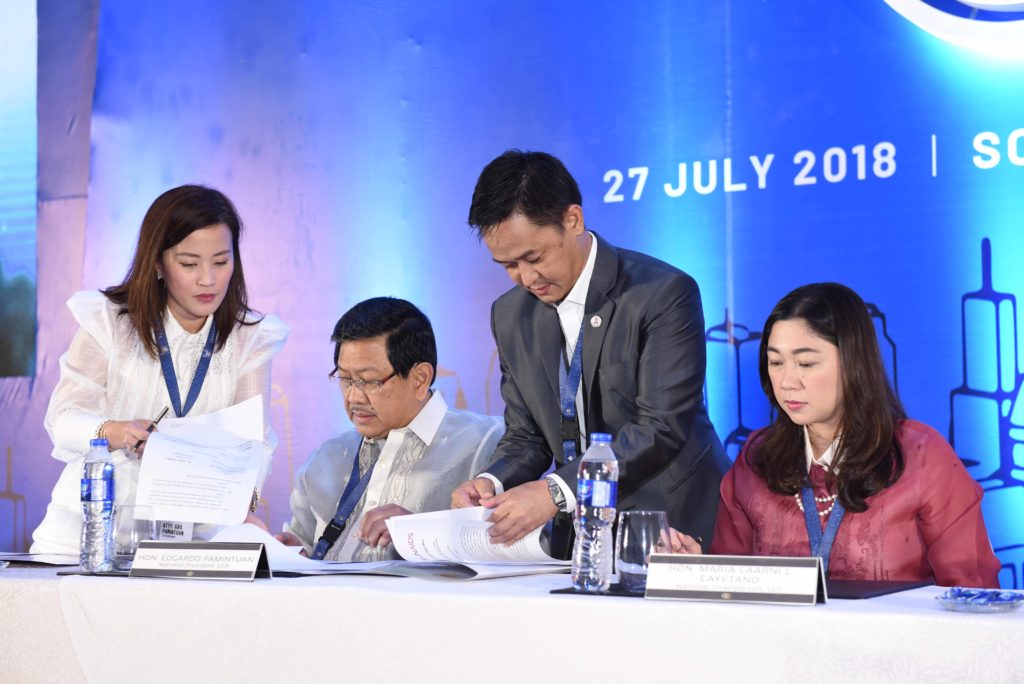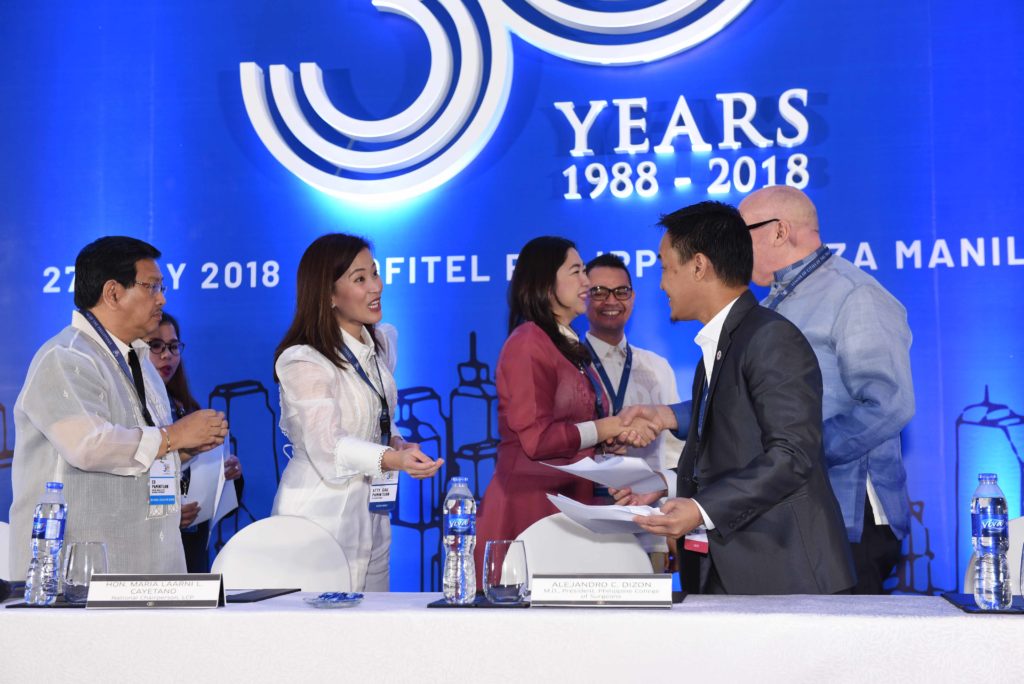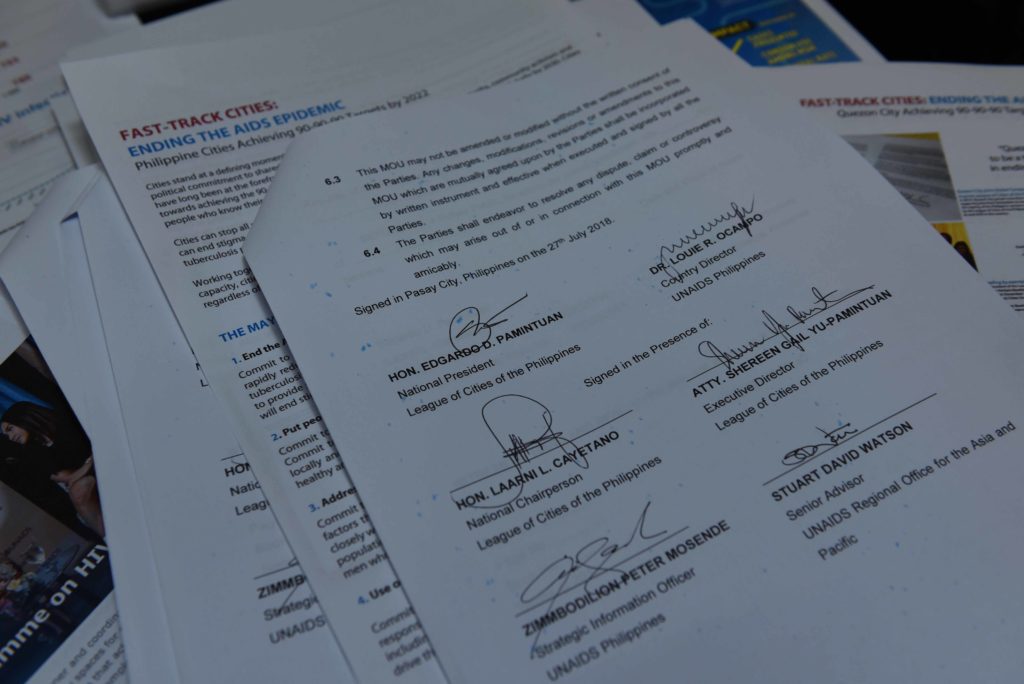The League of Cities of the Philippines (LCP) pledged to fast-track the AIDS response in the cities by signing a partnership agreement with UNAIDS to take actions and make investments which would contribute to reducing the number of new HIV infections in the country. The signing event took place on the fringe of the 66th General Assembly and Gala dinner for the LCP’s 30th Anniversary Celebrations on 27 July and brought together mayors and local representatives from 145 cities.
UNAIDS’ newly released report, Miles to go: closing gaps, breaking barriers, righting injustices, shows that the annual new infections have more than doubled in the Philippines in the past seven years to an estimated 12,000 in 2017. With a 174% increase since 2010, the Philippines has become the country with the fastest growing HIV epidemic in Asia and the Pacific. Cities and urban areas are particularly affected by HIV. Health authorities say that 70 cities, including the 17 cities in metro Manila, accounted for 80% of reported HIV cases in the country.
“The HIV/AIDS epidemic in the country is an issue that needs urgent action among local governments, especially since key populations at risk of infections reside mostly in the cities. In the City of Taguig we are very lucky to partner with UNAIDS to ramp up preventive measures to combat the epidemic. I encourage my peers at the League of Cities to also take action and contribute in controlling and, ultimately, ending HIV/AIDS in the country” said Hon. Ma. Laarni L. Cayetano, National Chair of the League of Cities of the Philippines.
While the Philippines has for many years had HIV services focusing on female sex workers, there is now a need to scale-up services tailored to other key populations and where they are located. More than 90% of new HIV infections are occurring among men who have sex with men (MSM) and transgender people (TG). Condom use among men who have sex with men and transgender people is low at 50% and 37% respectively and HIV testing is also low. Only 16% of MSM knew their HIV status in 2015.
In 2016 the Philippines joined 193 other United Nations member states to adopt the Sustainable Development Goals and committed to ending the AIDS epidemic by 2030. To achieve this commitment, UNAIDS encourages cities to accelerate their HIV response by reaching critical HIV prevention, treatment and zero discrimination targets by 2020. As dynamic centres for positive social change and sustainable development, cities offer inherent advantages to ensure that services are delivered to everyone in an equitable and efficient way.
Local governments in the Philippines are already stepping up to the plate by providing resources and implementing innovative HIV prevention services. For example, Quezon City has opened three Sundown clinics (Klinikas) which provide MSM and TG with rapid HIV testing and counseling, as well as HIV treatment in a non-stigmatizing environment. The city has increased its funding nine times since 2012 and is leading a push to encourage local city governments to invest more. Cebu region and Iloilo established service networks to increase access to different levels of care and Mandaue City is conducting outreach services among people living with HIV. Antipolo, Cebu and Mandaue have included a specific budget line item for HIV in their City Investment Plan for Health and are making efforts to ensure the sustainability of the HIV response.
“Philippines has a small window of opportunity to act fast and stop a major HIV epidemic from taking hold. This commitment is achievable if cities where the epidemic is having a big impact take the lead” said Eamonn Murphy, UNAIDS Regional Director forAsia and the Pacific. He also reaffirmed UNAIDS commitment to work in close partnerships with national and local authorities to support their efforts to bring the epidemic under control and provide technical expertise in how best to invest funds and implement innovations.
The cooperation agreement signed between the League of Cities of the Philippines and UNAIDS commits the network of member cities to advocate and support local leaders to fast-tracking the response to HIV to reverse the current trend of the epidemic. It also promises to strengthen the engagement of civil society, including people living with HIV and key populations, to scale up and expand local responses.
“The agile nature of cities puts than in an advantageous position to effectively manage the HIV/AIDS epidemic that is currently plaguing our country” said Hon. Edgardo D. Pamintuan, National President of the League of Cities of the Philippines. “I strongly believe that if we effectively implement HIV response strategies in our localities though our partnership with UNAIDS, our efforts at the city level can make a significant impact in reaching the country’s targets. Time is of essence. Let us roll up our sleeves and mobilize resources to combat the epidemic in the Philippines. The fight against HIV/AIDS will be won in the cities.”








